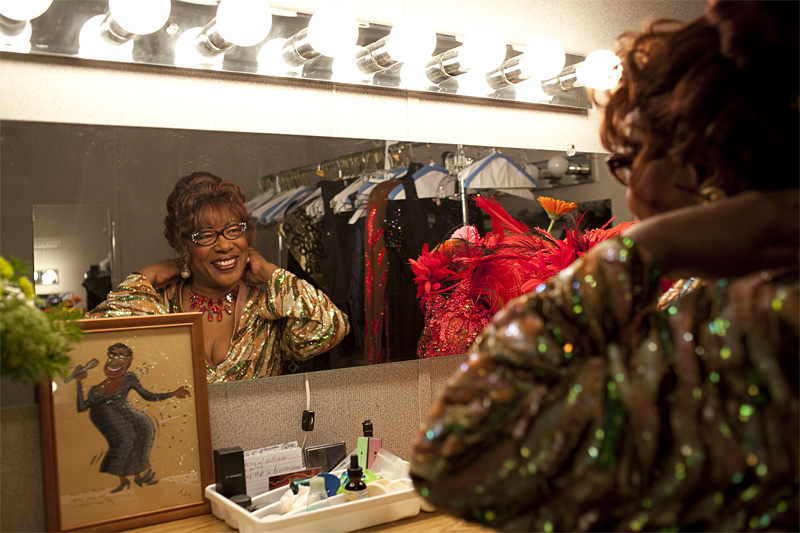Francine Reed is in her dressing room preparing for her performance in Teatro ZinZanni: Beaumount and Caswell when a young stagehand knocks on the door. He lingers there before entering and asks if she’s decent. “What do you think?” she asks mischievously. He hesitates, then nods his head yes. She chuckles. “Thanks, baby.”
At 62, the Chicago-bred chanteuse is still sassy as hell. It’s hard to imagine her doing anything but performing. She’s at obvious ease as she goes onstage later that same night, sauntering through the crowd, snapping her fingers and swaying her hips, demanding that the audience get up and dance. Reed’s got a distinctly husky, soulful voice, one that sounds like it belongs to a person who was weaned on whiskey and cigarettes. Her ability to belt out tunes effortlessly ensures that she doesn’t get lost in the chaos that is Teatro ZinZanni, a European-style cabaret show that includes a five-course meal, comedy, and circus acts.
“I was born singing,” she declares. “I came out, the doctor slapped me on the ass, and I went [sings] ‘Look at meeeee.'”
Reed, who’s logged more than 430 performances with Teatro ZinZanni both here and in San Francisco, is also known to fans of quirky country singer Lyle Lovett as his backup singer for more than 15 years. It’s a damn impressive career, especially when you consider that this single mother of four didn’t wholeheartedly pursue her dream of becoming a singer until her 30s.
One of seven children, she and her brothers and sisters grew up singing together at church in Kankakee, Ill., a small city south of Chicago. “Those were the days, my friend,” she says with a smile. “They let you sing and they fed you.” She began gigging at clubs in the city in her teens, hoping to be “discovered”—that is, until she became pregnant.
“I had the first of my four children at 19—and I’m telling you, that was late in my neighborhood,” she says. “I saw what happened to them other girls. So I held out for a long time. But eventually it happened to me too.”
As Reed’s children grew, so did the opportunities for her to book regular gigs. By her mid-30s, she had become a fixture in the Phoenix jazz scene, performing up to six nights a week. Lyle Lovett, at the time relatively unknown, dropped in on a performance one night, and after hearing her asked if she’d be interested in singing backup on his upcoming record. Reed agreed—for the paycheck, not because she was as impressed with him.
“He was tall, skinny, and strange-looking, with all this hair on his head,” she recalls. “I went into the studio and watched him through the glass, and later thought ‘That’s not him singing—but whoever is singing, he’s real good and he’s gonna be a star.'”
Lovett chuckles when I repeat Reed’s account of their first encounter over the phone. “That was the summer of ’84,” he says. “I remember I walked into the club right as she was belting out her signature song, ‘Wild Women Don’t Get the Blues.’ My first impression is the same one I have now—that she’s a natural. She’s one of my favorite singers in the world. When I go on tour, she’s the first call I make.”
Reed’s most recent appearance with Lovett was this past summer. Reportedly, his fans have since been heard to shout “Where’s Francine?” at concerts. But for Reed, who joined Teatro ZinZanni in 2004, remaining in one spot for months at a time is a welcome change of pace. Her preference for stability is good news for Reenie Duff, Teatro ZinZanni’s associate artistic director.
“The singer is one of the hardest roles to cast,” she says. “There are a lot of wonderful singers out there, but we need someone who can really blow the roof off. Francine has such an easy way with the music. It translates so well into what we do.”
It’s a sentiment that Reed feels as well. “I feel like I’m meant to be here now,” she declares, as she attempts to organize the clutter of makeup and jewelry on her dressing table. “When I go out there, the most important thing is that I change how the audience feels for the better, even if it’s for just a few moments. Well, that and to make a dollar—don’t ever forget that.”





